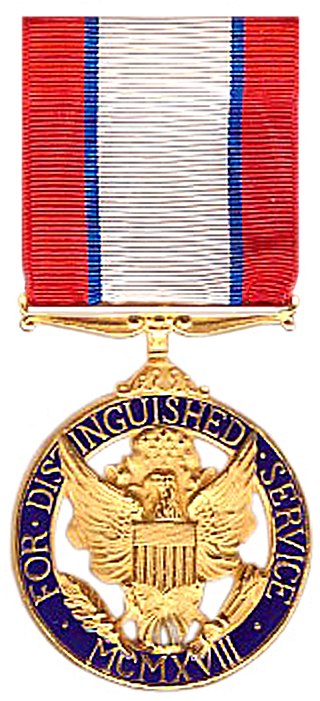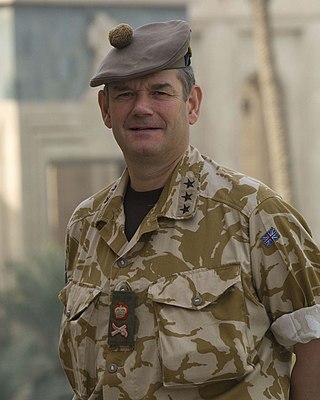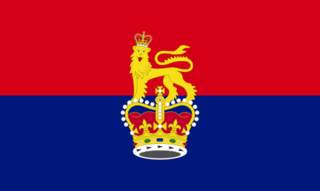
The Distinguished Service Medal (DSM) is a military decoration of the United States Army that is presented to soldiers who have distinguished themselves by exceptionally meritorious service to the government in a duty of great responsibility. The performance must be such as to merit recognition for service that is clearly exceptional. The exceptional performance of normal duty will not alone justify an award of this decoration.

A commander-in-chief or supreme commander is the person who exercises supreme command and control over an armed force or a military branch. As a technical term, it refers to military competencies that reside in a country's executive leadership, a head of state, head of government, or other designated government official.
Supreme Allied Commander is the title held by the most senior commander within certain multinational military alliances. It originated as a term used by the Allies during World War I, and is currently used only within NATO for Supreme Allied Commander Europe and Supreme Allied Commander Transformation.

Supreme Headquarters Allied Expeditionary Force was the headquarters of the Commander of Allied forces in northwest Europe, from late 1943 until the end of World War II. US General Dwight D. Eisenhower was the commander in SHAEF throughout its existence. The position itself shares a common lineage with Supreme Allied Commander Europe and Atlantic, but they are different titles.
The title chief of staff identifies the leader of a complex organization such as the armed forces, institution, or body of persons and it also may identify a principal staff officer (PSO), who is the coordinator of the supporting staff or a primary aide-de-camp to an important individual, such as a president, or a senior military officer, or leader of a large organization.

The Chief of the General Staff (CGS) has been the title of the professional head of the British Army since 1964. The CGS is a member of both the Chiefs of Staff Committee and the Army Board; he is also the Chair of the Executive Committee of the Army Board. Prior to 1964, the title was Chief of the Imperial General Staff (CIGS). Since 1959, the post has been immediately subordinate to the Chief of the Defence Staff, the post held by the professional head of the British Armed Forces.

An adjutant general is a military chief administrative officer.

John William "Jack" Vessey Jr. was a career officer in the United States Army. He attained the rank of general, and was most notable for his service as the tenth chairman of the Joint Chiefs of Staff.

The Chiefs of Staff Committee (CSC) is composed of the most senior military personnel in the British Armed Forces who advise on operational military matters and the preparation and conduct of military operations. The committee consists of the Chief of the Defence Staff who is the chairman and professional head of the forces, the Vice-Chief of the Defence Staff, who is the vice-chairman and deputy professional head of the armed forces. The committee also consists of the professional heads of each branch of the armed forces: the First Sea Lord and Chief of the Naval Staff, the Chief of the General Staff and the Chief of the Air Staff.

The Chief of Army Staff (COAS) (unofficially known as the Army Chief) is a statutory position in the Indian Army held by a four star general. As the highest-ranking officer to serve solely in the Indian Army, the chief is the professional head of the ground forces and a key adviser to the Minister of Defence. The COAS, in a separate capacity, is also a member of the National Security Council and thereby an advisor to the president and the prime minister. The COAS is typically the highest ranking army officer in the Indian Armed Forces, unless the Chief of Defence Staff and/or the Chairman Chiefs of Staff Committee is an army officer.
The First Washington Conference, also known as the Arcadia Conference, was held in Washington, D.C., from December 22, 1941, to January 14, 1942. President Roosevelt of the United States and Prime Minister Churchill of the United Kingdom attended the conference, where they discussed a future United Nations.

The Allies, or the Entente Powers, were an international military coalition of countries led by France, the United Kingdom, Russia, the United States, Italy, and Japan against the Central Powers of Germany, Austria-Hungary, the Ottoman Empire, and Bulgaria in World War I (1914–1918).

Lieutenant general, formerly more commonly lieutenant-general, is a senior rank in the British Army and the Royal Marines. It is the equivalent of a multinational three-star rank; some British lieutenant generals sometimes wear three-star insignia, in addition to their standard insignia, when on multinational operations.

The Army Board is the top single-service management committee of the British Army, and has always been staffed by senior politicians and soldiers. Until 1964 it was known as the Army Council.

The Allied leaders of World War II listed below comprise the important political and military figures who fought for or supported the Allies during World War II. Engaged in total war, they had to adapt to new types of modern warfare, on the military, psychological and economic fronts.

Roscoe Charles Wilson was a United States Air Force general who was Commandant of the Air War College from 1951 to 1954 and Deputy Chief of Staff, Development, from 1958 to 1961.

Army Headquarters is a British Army organisation based at Marlborough Lines, Hampshire. The equivalent in the Royal Navy is Navy Command Headquarters at Portsmouth, and the equivalent in the Royal Air Force is Headquarters Air Command at High Wycombe.
The Field Army is a command of the British Army responsible for generating and preparing forces for current and contingency operations. Commander Field Army reports to the Chief of the General Staff.













